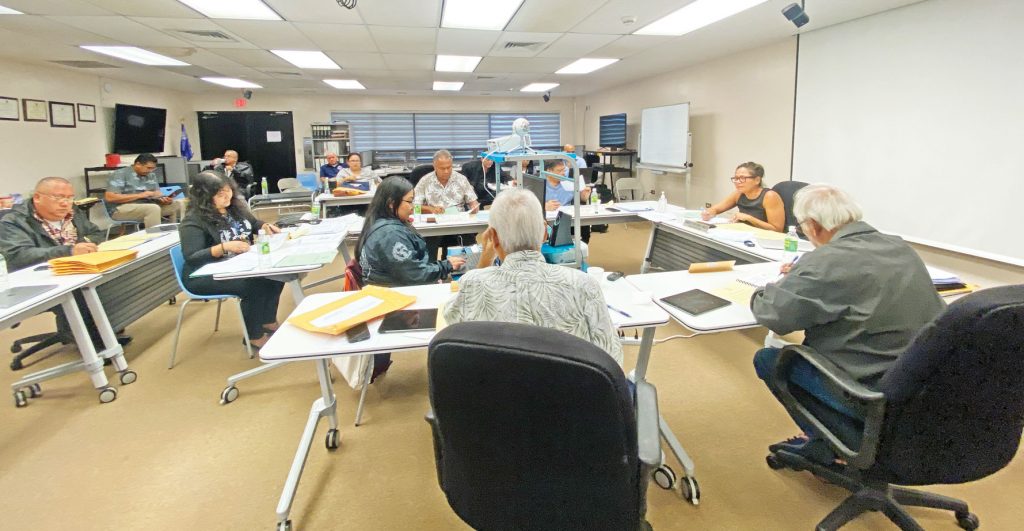IF EVERYTHING FAILS
‘It’s a dire outlook for CPA’

The Commonwealth Ports Authority board and executives hold a regular board meeting last Friday at the Aircraft Rescue and Firefighting classroom at the Airport Fire Station at the Francisco C. Ada/Saipan International Airport. (LEIGH GASES)
Commonwealth Ports Authority board chair Kimberlyn King-Hinds said they are not giving up on seeking federal assistance even after the U.S. House of Representatives did not expand the Essential Air Service program to the CNMI.
This, after Delegate Gregorio Kilili C. Sablan (D-MP) said in his e-kilili newsletter dated July 23, that the majority of the House rejected his amendment to H.R. 3935-Securing Growth and Robust Leadership in American Aviation Act, which would have reestablished eligibility for Marianas airports in the EAS program.
CPA officials recently visited Washington, D.C. and knocked on some doors for assistance in light of the CNMI’s financial crisis—including with the chairman of the Transportation Committee, Rep. Sam Graves (MO-60); EAS coordinators within the Department of Transportation; airport divisions; and congressional members.
However, King-Hinds said in an interview during a break in their CPA regular board meeting last Friday that the climate in Washington is not conducive to expanding the program to the CNMI which would subsidize interisland air service in large part because of the funding requirement.
But despite that, King-Hinds said they are not giving up and are looking at other options such as potentially getting the U.S. Department of Defense to include it in the National Defense Authorization Act.
King-Hinds said that decreasing costs for interisland commuters not only benefits residents, but it also benefits national security initiatives.
“National security is having an impact on the overall economy of the CNMI. Nobody here has an opinion with regards to where tourists come from. But obviously, the pivot from China represents a significant portion of our arrivals. And so, we all need to collectively work together to find a way to fill in that gap for the benefit of the entire Commonwealth, not just for CPA,” she said.
Along with this, she said another reason is that transportation and housing are issues on Tinian.
“You have defense contractors basically struggling with finding housing on Tinian and what seems to be happening is that folks are hired and they stay on Saipan and have to commute to do the work on Tinian. So, that all adds on to the cost of these construction projects and that’s an angle that we’re working on is trying to find that nexus to national security so that we can get them to assist us by having them advocating on behalf of the CNMI,” King-Hinds said.
She added that EAS is directly tied to the ability of the CNMI to market Tinian and Rota for them to be able to have their own tourism industry.
Aaside from the national security and tourism industry issues, people on Tinian and Rota rely on air transportation to get basic medical services, King-Hinds said. “When you’re bringing in folks to come in and work on Tinian, you have to be concerned that if they get injured, and there is no hospital on Tinian, that you’re going to have to transport these folks here to Saipan and you need reliable air transportation to be able to do that,” she said.
When asked what impacts there would be if efforts on finding assistance fails, King-Hinds said, “It’s a dire outlook.”
CPA anticipates an increase in airport rates and when increasing rates, she said this has a cascading effect basically on the entire Commonwealth, “because that means that you are now passing on the cost to your airport partners.”
Currently, she said the rate is $19 and some cents for terminal rental rates and it could potentially double to $40.
That’s why, King-Hinds said, that the ask for assistance with the Department of Transportation is to subsidize operational costs “so that we can reduce our current rate to an amount that’s attractive to be able to sustain our current market and to incentivize new entries to the market.”
“In the absence of that, what’s basically going to happen is you’re going to have these [LLCs] questioning whether it’s economically viable to continue coming to the CNMI. How do we go and attract new airlines to come when your airport rates are significantly high in comparison to other markets?” she asked.
“There’s an impact here,” she said. “That’s why we’re doing everything that we can. This is why we went to D.C. This is why we knocked on doors. …It was a very frank discussion basically about their impact on the economy and the need to collaborate and find a way moving forward because doing nothing basically will put the CNMI in a complete welfare system. That’s where we’re heading if none of these changes. This is literally where we’re heading, where it’s feast or famine for the people who live here. And I think that’s unacceptable, it’s sad. CPA is committed to finding every opportunity that’s available out there and pursuing all options under the sun, to be able to address this issue.”























